 When you're single in your 30's, everyone wants to know why. So do you. And everyone wants to know how the heck you're going to meet him when you've missed the school, church, young people single niche. And when they panic for me, I always say Elizabeth. Barrett. Browning.
When you're single in your 30's, everyone wants to know why. So do you. And everyone wants to know how the heck you're going to meet him when you've missed the school, church, young people single niche. And when they panic for me, I always say Elizabeth. Barrett. Browning.And in the spirit of Valentines and Guernsey Literary and Potato Peel Society, Elizabeth Barrett Browning's wildly romantic story must be shared because, like Juliet Ashton, Elizabeth Barrett's love story began with a letter from a stranger.
The Sickly Young Woman Not Allowed to Marry
She became sickly in her early years with nobody knows what. With 12 children in the family, Elizabeth was well taken care of by her brothers, sisters, mother and father. They encouraged her to stay inside, encouraged her to write and to take morphine for the pain. She did and became an addict. But she also wrote in a scholarly fashion that flabberghasted society. She was a young woman who could read the Old Testament in the original Hebrew and Dante's Inferno in archaic Italian/ Latin. Her father was very proud of his daughter and encouraged her to continue her talent, especially as it was a talent she could persue indoors and at home. You see, Mr. Barrett, a Jamaican plantation owner, vowed that his children would not leave home and would not marry. Rather unusual for the day where most fathers were obsessessed with marrying their children off to further their fortunes, Mr. Barrett promised that whoever married would be disinherited.

The First Letter (edited)
January 10th, 1845 New Cross, Hatcham, Surrey
I love your verses with all my heart, dear Miss Barrett,--and this is no off-hand complimentary letter that I shall write,-- since the day last week when I first read your poems, I quite laugh to remember how I have been turning again in my mind what I should be able to tell you of their effect upon me-- so into me has it gone, and part of me has it become, this great living poetry of yours, not a flower of which but took root and grew... I can give reason for my faith in one and another excellence, the fresh strange music, the affluent language, the exquisite pathos and true new brave thought--but in this addressing myself to you, your own self, and for the first time, my feeling rises altogher. I do, as I say, love these Books with all my heart-- and I love you too: do you know I was once seeing you? Mr. Kenyon said to me one morning "would you like to see Miss Barrett?"--then he went to announce me,--then he returned... you were too unwell -- and now it is years ago--and I feel as at some untorward passage in my travels--as if I had been close, so close, to some world's-wonder in chapel on crypt,... only a screen to push and I might have entered -- but there was some slight... so it now seems... slight and just-sufficient bar to admission, and the half-opened door shut, and I went home my thousands of miles, and the sight was never to be!
But it was to be. Robert Browning returned to 50 Wimpole Street in London with a mutual poet acquaintence and would not move until he met Elizabeth. It began slowly, for Elizabeth was suspicious that such a striking, passionate young man (6 years her junior) could truly love her. Also, they had to remain in appearance tutor and pupil. If her father ever suspected, Mr. Browning would be packing immediately. Elizabeth took all of her rising passions, doubts, longings and turned them into her most famous prose: Sonnets from the Portugeuse. Browning called Elizabeth "The Portuguese" because of her Creole ancestory, her dark coloring. She wrote:
If thou must love me, let it be for noughtExcept for love's sake only. Do not say'I love her for her smile---her look---her way Of speaking gently,---for a trick of thought That falls in well with mine, and certes brought A sense of pleasant ease on such a day'---For these things in themselves, Belovèd, may Be changed, or change for thee,---and love, so wrought, May be unwrought so. Neither love me forThine own dear pity's wiping my cheeks dry,---A creature might forget to weep, who boreThy comfort long, and lose thy love thereby! But love me for love's sake, that evermore Thou mayst love on, through love's eternity
And:
Belovèd, my Belovèd, when I think That thou wast in the world a year ago,What time I sat alone here in the snowAnd saw no footprint, heard the silence sink No moment at thy voice, but, link by link,Went counting all my chains as if that so They never could fall off at any blow Struck by thy possible hand,---why, thus I drink Of life's great cup of wonder! Wonderful, Never to feel thee thrill the day or nightWith personal act or speech,---
And:
First time he kissed me, he but only kissedThe fingers of this hand wherewith I write;And ever since, it grew more clean and white,Slow to world-greetings, quick with its 'Oh, list,'When the angels speak. A ring of amethystI could not wear here, plainer to my sight,Than that first kiss. The second passed in heightThe first, and sought the forehead, and half missed,Half falling on the hair. O beyond meed!That was the chrism of love, which love's own crown,With sanctifying sweetness, did precede.The third upon my lips was folded downIn perfect, purple state; since when, indeed,I have been proud and said, 'My love, my own.'
And:
How do I love thee? Let me count the ways. I love thee to the depth and breadth and height My soul can reach, when feeling out of sightFor the ends of Being and ideal Grace.I love thee to the level of everyday'sMost quiet need, by sun and candle-light.I love thee freely, as men strive for Right;I love thee purely, as they turn from Praise.I love thee with a passion put to useIn my old griefs, and with my childhood's faith.I love thee with a love I seemed to loseWith my lost saints, --- I love thee with the breath,Smiles, tears, of all my life! --- and, if God choose,I shall but love thee better after death.
And so it was. Elizabeth Barrett Browning never even left her house, frail and in her 30's she had given up all hope of deep, abiding love. And yet, deep and abiding love will find a way and it came in a letter, a man who would take her away in the night to Italy where they would live together, have their child (she was 43) and remain until her death in 1861.
How is it possible to find true love when there is no one and the world has passed you by? Elizabeth. Barrett. Browning.

 Elizabeth and her son (yes, son) Robert Wideman Browning.
Elizabeth and her son (yes, son) Robert Wideman Browning.




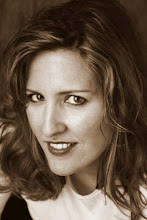


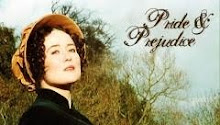





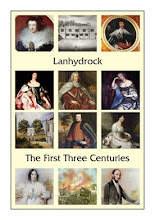

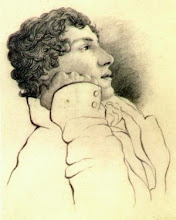

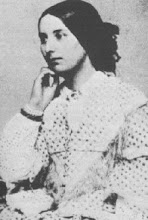


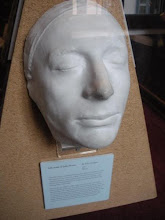

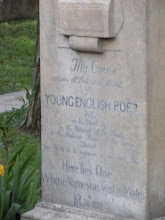
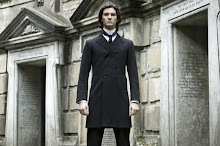


There IS hope for us 30-somethings who've missed the other trains. I'm holding out for my Mr. Darcy!
ReplyDeleteI don't look at it so much as missing the trains or waiting for Mr. Darcy (seriously, that guy is way too serious for me) but more like allowing things to happen IF they're supposed to happen, when they're supposed to happen and not rushing about caring about it so.
ReplyDeletegreat post. i love the "how do i love thee" poem.
ReplyDeletebtw: you've been awarded ;-D
http://vvb32reads.blogspot.com/2010/02/one-lovely-blog-award.html
Awww.... Thanks Velvet!!!
ReplyDeleteI find that the poems and her story quite beautiful. It's not about how old you are, it's about the gift we receive. Love is a mystery and it catchs us unexpected...when we're not looking. And I find that this woman, against all odds, got her gift of freedom in the love she had for Robert Browning. She talked about the shakles around her wrist that stopped her from loving him freely, the way love should be given. And when you look at society today, it shouldn't be about age or soical standing it's about weather or not your love is true. It's about accepting the person with everything, the flaws and the good stuff. So when you look at it, it all comes down to loving the person for what's on the inside, underneath the pretty face and the pretty clothes...it's loving that inner child of that person...........
ReplyDelete